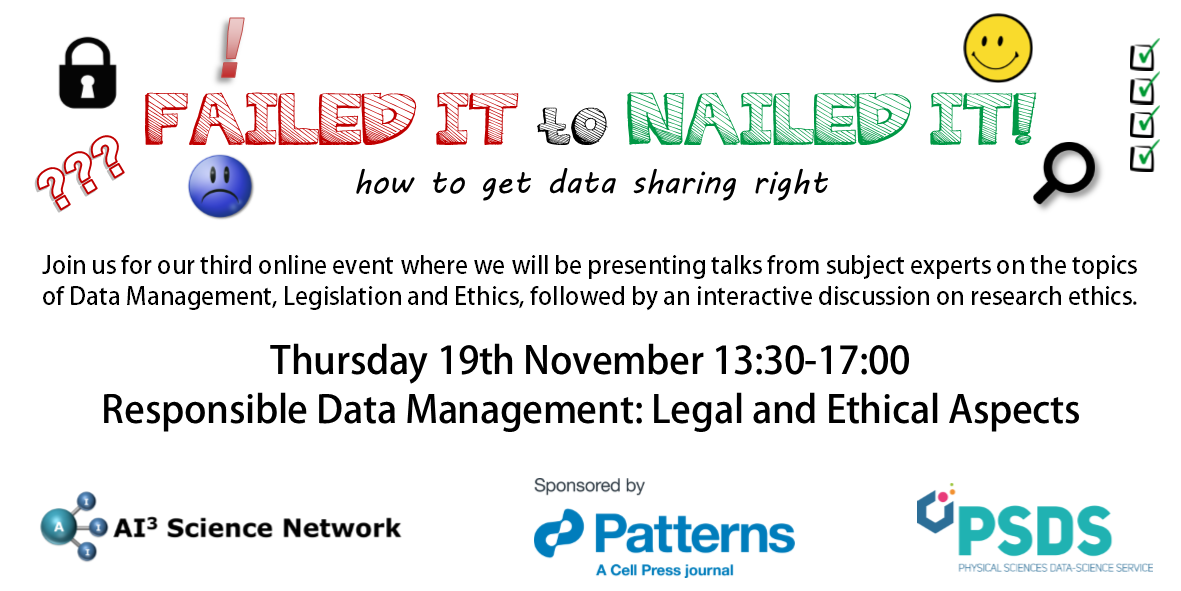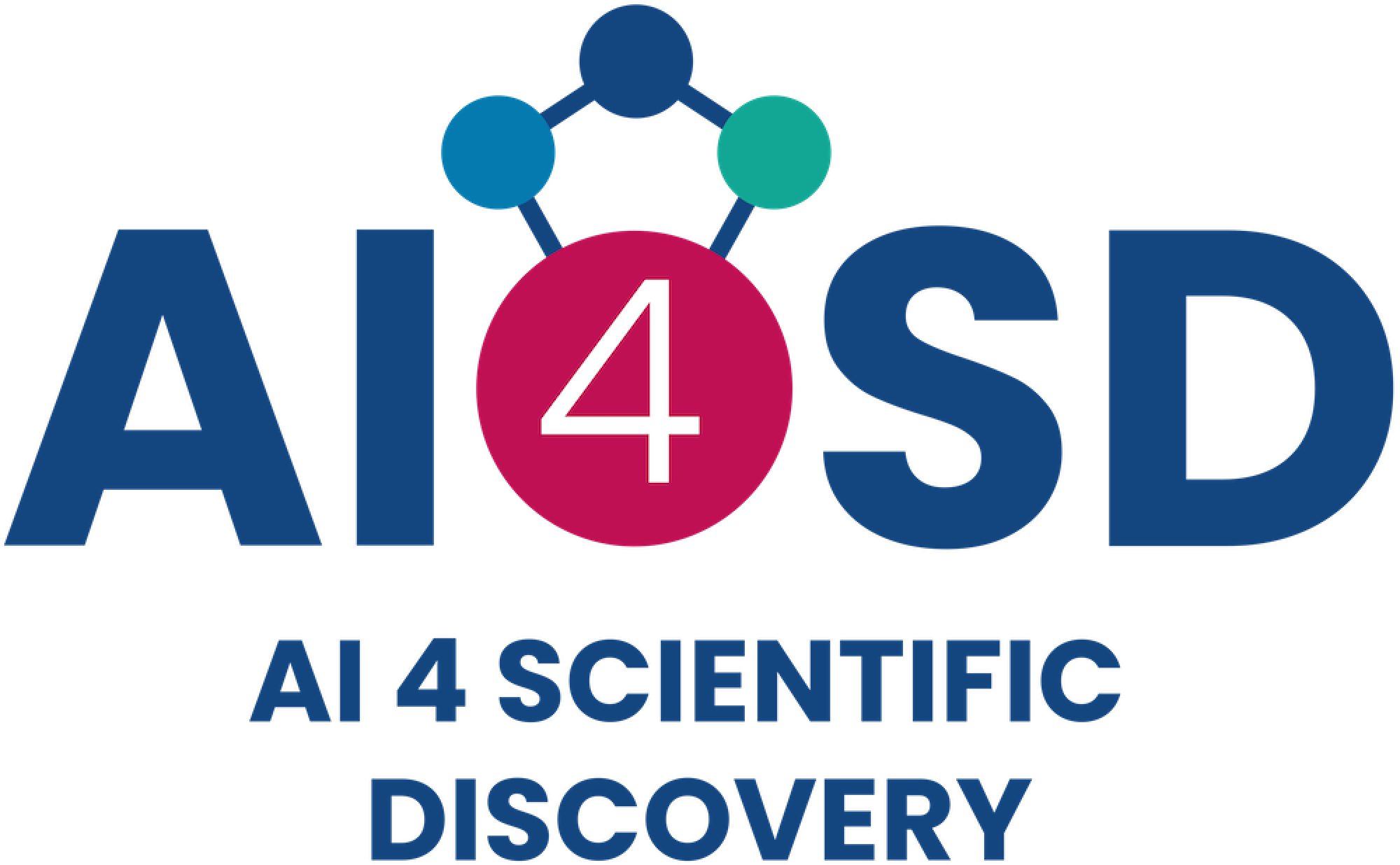
- This event has passed.
19/11/2020 – Failed it to Nailed it! How to get data sharing right! – Responsible Data Management: Legal & Ethical Aspects
19th November 2020 @ 1:30 pm - 5:00 pm
Free
Eventbrite Link: https://fi2ni-responsibledata-191120.eventbrite.co.uk
This event forms part of the ‘Failed it to Nailed it – Getting Data Sharing Right’ series. This series is run by the Artificial Intelligence for Scientific Discovery Network+ (AI3SD), the Cell Press Patterns Journal and the Physical Sciences Data-Science Service (PSDS). These events are a product of the data sharing survey we ran earlier this year.
Description
This event is the third of four events in our ‘Failed it to Nailed it – Getting Data Sharing Right’ series. In this event we aim to provide information and advice on different areas of responsible data management. The event includes talks on different aspects of this including the ethical dimensions of research data management and different types of legislation with respect to personal and non personal data. We will also be including an interactive breakout session using a set of Moral IT cards developed by researchers at the University of Nottingham: https://lachlansresearch.com/the-moral-it-legal-it-decks/
Agenda
- 13:30-13:50 – Introductions & Coffee & Welcome
- 13:50-14:20 – Ethical data management – balancing individual privacy and public benefit – (Zosia Beckles – University of Bristol)
- 14:20-14:50 – Data legislation, personal and non-personal data, ethical issues and protecting your IP rights – (Michele Voznick – Pinsent Masons LLP)
- 14:50-15:20 – Coffee Break
- 15:20-15:50 – Practical Ethics for Data Science and Algorithm Design – (Tessa Darbyshire – Cell Press Patterns)
- 15:50-16:50 – Interactive Activity (Peter Craigon – University of Nottingham: Moral IT cards & Ethics)
- 16:50-17:00 – Sum Up & Close
Abstracts & Speaker Biographies
- Ethical data management – balancing individual privacy and public benefit – Zosia Beckles:
This talk will cover aspects of ethical data management, focussing on the key issues of participant consent, data minimisation, and data anonymisation, using examples from health sciences and engineering. Content within the talk aims to cover: big picture issues (societal benefits to data sharing versus individual right to privacy), relevant legislation (GDPR, DPA 2018 and FoIA 2000), what happens when things go wrong, managing risk via informed consent, data minimisation and anonymisation (formal, statistical and functional) and best practice guidelines and tools.
Bio: Zosia Beckles is an experienced information professional with a background in health informatics and research data management in the higher education and research sectors. She currently works with Library Research Support at the University of Bristol, providing training and support to academics in research metrics/bibliometrics and sensitive research data management, including the development of a new dataset disclosure risk assessment service to enable safe publication of sensitive data.
- Data legislation, personal and non-personal data, ethical issues and protecting your IP rights – Michele Voznik: Scientists and researchers handle vast amounts of data in the course of their work, and in recent years technology and computational power has revolutionised the ability to create, store and analyse data. Scientific research increasingly now requires scientists to be skilled in computational analysis and the ability to work with algorithms, as they deal with larger and larger data sets. The handling of data in science brings with it legal considerations in relation to data protection and intellectual property rights. This talk will give an overview of the data legislation that applies to scientists and researchers including guidance from data protection authorities and decisions taken by courts, the differences between personal and non-personal data, the ethical issues involved in the use of algorithms and how you can protect your intellectual property rights.
Bio: Michele specialises in privacy, data protection and information law. Her previous work with regulators in the UK and Europe means she brings a unique depth of knowledge and understanding to advising clients on the interpretation and application of this complex area of law. As a UK national expert, she was seconded from the Information Commissioner’s Office to the European Commission to work on the GDPR, e-privacy reform and the Digital Single Market. Michele has extensive experience of advising national and multi-national corporations on compliance and data use beyond compliance to optimise their data strategies. She is in strong demand as a speaker, writer and trainer on all aspects of data protection, privacy, Freedom of Information and Environmental Information. - Practical Ethics for Data Science and Algorithm Design – Tessa Darbyshire: ‘Ethics’ is widely considered to be fuzzy, vague and an oft moving target. In this talk we will not discuss the dead white men who have debated the nature of ethics down the centuries (here’s looking at you, Kant). We will instead take the lack of consensus as given and explore instead what concrete measures may be pursued as valid proxies for ethical behavior in the fields of data science, machine learning and AI.
Bio: Tessa has a philosophy background, and her academic work, within a global group, focuses on the computer/human interface, particularly in relation to explainability, interpretability, and trust. She has expertise across the fields of technical validity, privacy legislation, and ethical practice, particularly in relation to the human impact of data. She is particularly fond of papers with an arboreal bent, as reading them goes some of the way to make up for living in the Big Smoke. - Interactive Activity – Peter Craigon: The Moral-IT cards, developed by Dr Lachlan Urquhart (now at Edinburgh) and Dr Peter Craigon, at the Horizon Digital Economy Research Institute at the University of Nottingham[1], are used as a tool to prompt reflection on the legal, ethical, technical and social implications of new information technologies. In this interactive session we will be using the Moral-IT cards to prompt discussion and thought on the ethical implications that a user’s research can have, and how they can consider these angles in their experiment and research design. The session will be introduced by Dr Peter Craigon from the University of Nottingham and discussion groups will be faciliated by members of our organising team. The Moral-IT cards are licensed under a Creative Commons Attribution-NonCommercial-ShareAlike 4.0 International License and more information can be found on this website: https://lachlansresearch.com/the-moral-it-legal-it-decks/
[1] Urquhart, L., Craigon, P., 2020. The Moral-IT Deck: A Tool for Ethics by Design. arXiv:2007.07514 [cs].
Bio: Peter Craigon is a Research Fellow in Ethics, Legislation and Engagement in Food and Agricultural Innovation within the Future Food Beacon of Excellence at the University of Nottingham. He is working with Professor Kate Millar and Professor Richard Hyde on developing tools to encourage ethical engagement and regulatory responsiveness for researchers working in food and agricultural innovation and beyond. He previously worked at the Horizon Digital Economy Research Institute at the University of Nottingham developing a tool to enable ethical design of IT based technologies and also at the University of Nottingham School of Veterinary Medicine and Science researching dog behaviour. Alongside this he completed a multidisciplinary PhD at the Horizon Centre for Doctoral Training also at the University of Nottingham exploring how social maps create knowledge about place.
